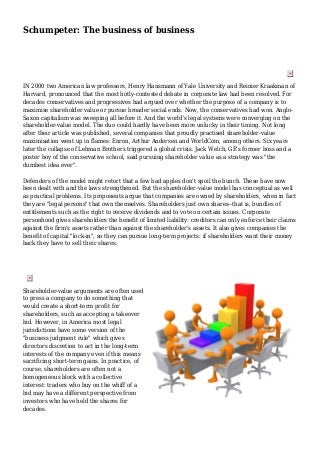
Schumpeter: The business of business
- 1. Schumpeter: The business of business IN 2000 two American law professors, Henry Hansmann of Yale University and Reinier Kraakman of Harvard, pronounced that the most hotly-contested debate in corporate law had been resolved. For decades conservatives and progressives had argued over whether the purpose of a company is to maximise shareholder value or pursue broader social ends. Now, the conservatives had won. Anglo- Saxon capitalism was sweeping all before it. And the world's legal systems were converging on the shareholder-value model. The duo could hardly have been more unlucky in their timing. Not long after their article was published, several companies that proudly practised shareholder-value maximisation went up in flames: Enron, Arthur Andersen and WorldCom, among others. Six years later the collapse of Lehman Brothers triggered a global crisis. Jack Welch, GE's former boss and a poster boy of the conservative school, said pursuing shareholder value as a strategy was "the dumbest idea ever". Defenders of the model might retort that a few bad apples don't spoil the bunch. These have now been dealt with and the laws strengthened. But the shareholder-value model has conceptual as well as practical problems. Its proponents argue that companies are owned by shareholders, when in fact they are "legal persons" that own themselves. Shareholders just own shares--that is, bundles of entitlements such as the right to receive dividends and to vote on certain issues. Corporate personhood gives shareholders the benefit of limited liability: creditors can only enforce their claims against the firm's assets rather than against the shareholder's assets. It also gives companies the benefit of capital "lock-in", so they can pursue long-term projects: if shareholders want their money back they have to sell their shares. Shareholder-value arguments are often used to press a company to do something that would create a short-term profit for shareholders, such as accepting a takeover bid. However, in America most legal jurisdictions have some version of the "business judgment rule" which gives directors discretion to act in the long-term interests of the company even if this means sacrificing short-term gains. In practice, of course, shareholders are often not a homogeneous block with a collective interest: traders who buy on the whiff of a bid may have a different perspective from investors who have held the shares for decades.
- 2. With conservatives on the defensive, progressives are now pressing their advantage. In a new book, "How Good We Can Be", Will Hutton, a British newspaper columnist, calls for a "Companies Act for the 21st century": firms should be required to declare on incorporation their intention "to deliver particular goods and services that serve a societal or economic need". In a recent lecture to the British Academy, Colin Mayer, a management professor at Oxford University, called for companies to be required to "articulate their purposes". Directors should be held to account for the delivery of these stated purposes. Controlling ownership should be in the hands of people who can ensure that directors discharge their responsibilities. Mr Mayer says a striking number of what he sees as the world's best firms, such as Bosch, Carlsberg, Bertelsmann and Tata, are owned by foundations that are pledged to pursue the public good. Darrell West of the Brookings Institution in Washington, DC, notes the decline of the idea that companies are creatures of the state, given the privilege of incorporation in return for pursuing a broad public purpose. This all sounds very enlightened. But who will decide whether new companies are likely to serve the public good? Will a committee of the great and the good interrogate young app designers about the social benefits of their inventions? Will foreign competitors who are not required to pass a public- interest test be barred from the market? Or domestic entrepreneurs who choose to incorporate abroad?
- 3. Nor are foundations the paragons that Sir Colin imagines: they are frequently created to reduce corporate tax burdens and invariably hand power to a select group of insiders. Carlsberg is struggling, after going heavily into the Russian market, and recently replaced its CEO. Bertelsmann remains highly dependent on its German television stations despite repeated attempts to join the digital revolution. Tata has lots of underperforming businesses as well as some excellent ones. As for Mr West and the supposed virtues of companies as creatures of the state, the one-word response to that is: Petrobras. ...is business The secret of the modern company's success is precisely that it is such an open-ended organisation. Until the 19th century companies had to pursue a public purpose (imperial domination, usually) in return for limited liability. But various governments, starting in Britain and America, swept away these restrictions and let companies form for no other purpose than to engage in business. This simple act of liberalisation did as much as anything to create the modern economy. Open-endedness lets companies evolve: startups have very different purposes to mature businesses. Open-endedness reflects the realities of corporate life: far from being slaves to the share price, as progressives imagine, most companies are engaged in a constant process of negotiation between managers and investors over their strategy and time horizons. Mature companies such as Shell, Intel and Nestlé often invest for the long term without a squeak from fund managers. New-economy companies such as Google, Facebook and, particularly, Amazon have had no difficulty in persuading investors to sacrifice short-term returns (and indeed any control whatsoever) in return for long-term rewards. That businesses do not have to declare a lofty purpose so as to enjoy the privilege of incorporation is not a bug but a feature. Indeed, it is the defining feature of the modern corporation. Change it and you wreck the entire machine. http://www.economist.com/news/business/21646742-old-debate-about-what-companies-are-has-been- revived-business-business